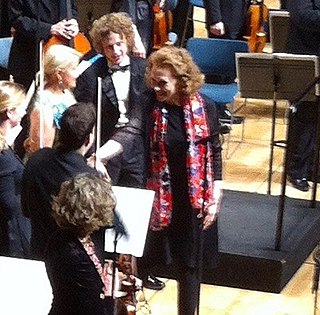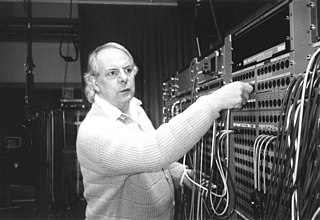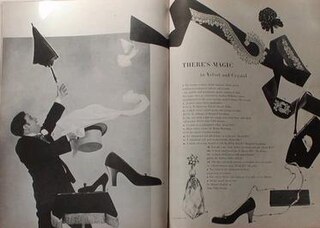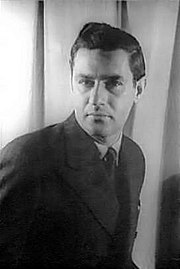Adam Guettel is an American composer-lyricist of musical theater and opera. The grandson of musical theatre composer Richard Rodgers, he is best known for the musical The Light in the Piazza, for which he won two Tony Awards, for Best Score and Best Orchestrations, and two Drama Desk Awards, for Best Music and Best Orchestrations.

Kaija Anneli Saariaho is a Finnish composer based in Paris, France. During the course of her career, Saariaho has received commissions from the Lincoln Center for the Kronos Quartet and from IRCAM for the Ensemble Intercontemporain, the BBC, the New York Philharmonic, the Salzburg Music Festival, the Théâtre du Châtelet in Paris, and the Finnish National Opera, among others. In a 2019 composers' poll by BBC Music Magazine, Saariaho was ranked the greatest living composer.
Otto Clarence Luening was a German-American composer and conductor, and an early pioneer of tape music and electronic music.

Amahl and the Night Visitors is an opera in one act by Gian Carlo Menotti with an original English libretto by the composer. It was commissioned by NBC and first performed by the NBC Opera Theatre on December 24, 1951, in New York City at NBC Studio 8H in Rockefeller Center, where it was broadcast live on television from that venue as the debut production of the Hallmark Hall of Fame. It was the first opera specifically composed for television in the United States.

Rolf Liebermann, was a Swiss composer and music administrator. He served as the Artistic Director of the Hamburg State Opera from 1959 to 1973 and again from 1985 to 1988. He was also Artistic Director of the Paris Opera from 1973 to 1980.
Patricia Neway was an American operatic soprano and musical theatre actress who had an active international career during the mid-1940s through the 1970s. One of the few performers of her day to enjoy equal success on both the opera and musical theatre stages, she was a regular performer on both Broadway and at the New York City Opera during the 1950s and 1960s.
Judith Blegen is an American soprano, particularly associated with light lyric roles of the French, Italian and German repertories.
Arlene Saunders was an American spinto soprano opera singer. After making her operatic debut as Rosalinde von Eisenstein, in Die Fledermaus, with the National Opera Company in 1958, she made her first appearance with the New York City Opera in 1961, as Giorgetta in Il tabarro. With that company, she soon sang in Carmen, La bohème, Louise, Die lustige Witwe and Don Giovanni.

John Reardon was an American baritone and actor who was noted for his performances on television, including many appearances on the PBS children's television show Mister Rogers' Neighborhood.
Rosemary Kuhlmann was an American operatic mezzo-soprano and Broadway musical actress best known for originating the role of the Mother in Gian Carlo Menotti's Amahl and the Night Visitors, the first opera commissioned for television. Kuhlmann portrayed the role on the annual live NBC broadcast of the production from 1951 through 1962.
Jean Kraft was an American operatic mezzo-soprano. She began her career singing with the New York City Opera (NYCO) during the early 1960s, after which she embarked on a partnership with The Santa Fe Opera from 1965 through 1987. In 1970 she joined the roster of singers at the Metropolitan Opera in New York City where she remained a fixture until 1989. She also performed as a guest of many other opera companies throughout the United States. In 2005 Opera News called her "a gifted mezzo and observant, imaginative actress who lent distinction to a wide range of character roles. By the end of her Met tenure, she had sung nearly 800 performances and become a solid audience favorite."

Freitag aus Licht, the main body of which is also titled Freitag-Versuchung, is the fifth to be composed of the seven operas that comprise Licht (Light), by Karlheinz Stockhausen. It was the last of the operas to receive a staged production with the composer's involvement.
Quartet San Francisco is a non-traditional and eclectic string quartet led by violinist and String Masters co-founder Jeremy Cohen. The group played their first concert in 2001 and has recorded five albums. Playing a wide range of music genres including jazz, blues, tango, swing, funk, and pop, the group challenges the traditional classical music foundation of the string quartet.

Andrew McKinley was an American operatic tenor, violinist, arts administrator, music educator, and school administrator. Although he mainly performed in the United States, he had an active international singing career with major opera companies and symphony orchestras from the 1940s through the 1960s. His repertoire spanned a wide range, from leading tenor parts to character roles.
David Aiken was an American operatic baritone, opera director, and United States Army Air Forces officer. He was particularly associated with the works of Gian Carlo Menotti, and is best remembered for creating the role of King Melchior in the world premiere of Menotti's Amahl and the Night Visitors.
Saramae Endich was an American classical soprano who had an active performance career in concerts and operas during the 1950s and 1960s.

Gian Carlo Menotti was an Italian-American composer, librettist, director, and playwright who is primarily known for his output of 25 operas. Although he often referred to himself as an American composer, he kept his Italian citizenship. One of the most frequently performed opera composers of the 20th century, his most successful works were written in the 1940s and 1950s. Highly influenced by Giacomo Puccini and Modest Mussorgsky, Menotti further developed the verismo tradition of opera in the post-World War II era. Rejecting atonality and the aesthetic of the Second Viennese School, Menotti's music is characterized by expressive lyricism which carefully sets language to natural rhythms in ways that highlight textual meaning and underscore dramatic intent.
Kurt Honolka was a German musicologist, journalist, and music and theatre critic. He is known as a translator of the librettos of Czech operas into German, such as Smetana's Dalibor and Janáček's Osud.
Joanna Mary Bruno, also known as Joanna Bruno-Clarke, is an American operatic soprano who had an active international career during the 1960s and 1970s. A lyric soprano, she often performed in operas by Giacomo Puccini and Wolfgang Amadeus Mozart. In the United States she performed frequently with the Santa Fe Opera and the New York City Opera, and in Europe she performed in multiple operas with the Dutch National Opera and the Scottish Opera among others. She is best remembered for her performances in the operas of Gian Carlo Menotti, notably creating the role of Cora Arnek in the world premiere of Menotti's The Most Important Man in 1971.
William Workman (born February 4, 1940, Valdosta, Georgia is an American baritone who had an active career in operas and concerts from the 1960s into the 2000s. Particularly active with the Hamburg State Opera and Opera Frankfurt, he notably created the roles of Tony in the world premiere of Gian Carlo Menotti's Help, Help, the Globolinks! and Prince Henri of Condé in the world premiere of Krzysztof Penderecki's The Devils of Loudun. His final appearance with the HSO was as Osmin in Mozart's Die Entführung aus dem Serail in 2004.







